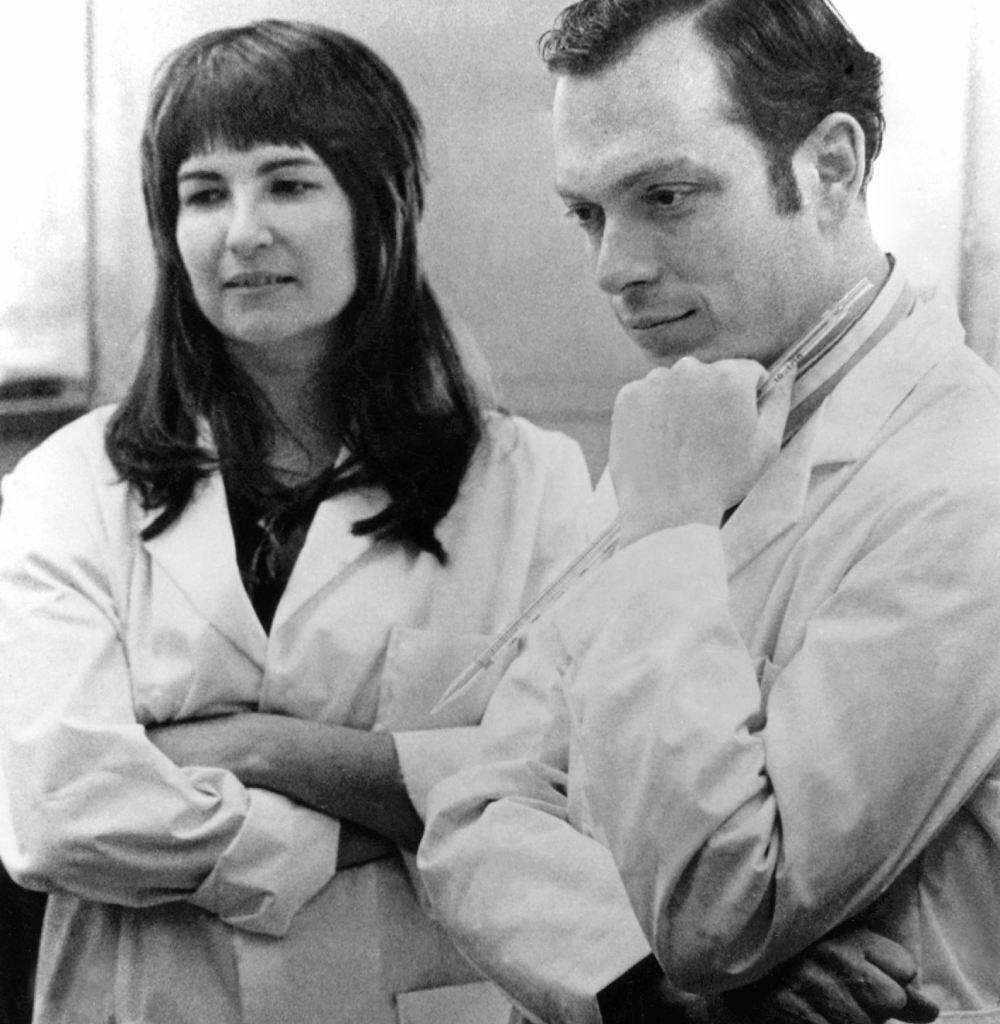Alive Blog
The biology of belief
Dr. Bruce Lipton and Dr. Candace Pert
The concept popularized by Bruce Lipton, often referred to as “mind over genes,” is centred around the idea that our thoughts, beliefs, and perceptions can influence our genetic expression and overall health. This concept challenges the conventional belief that our genetic makeup solely determines our physical and mental well-being.
Mind Over Genes
In the realm of scientific inquiry, the prevailing belief for decades was that our genetic makeup dictates our health and destiny. However, the groundbreaking work of cellular biologist Bruce Lipton has challenged this notion, ushering in a paradigm shift that explores the profound influence of the mind on genetic expression. The concept of “mind over genes” proposes that our thoughts, beliefs, and perceptions can profoundly impact our biology, transforming our understanding of health and well-being.
At the heart of the “mind over genes” theory lies the principle of epigenetics. Unlike the deterministic view of genetics, where our DNA was considered an unchangeable script for our lives, epigenetics recognizes that genes are not our destiny. Epigenetic mechanisms control which genes are turned on or off in response to environmental factors, including thoughts, emotions, and lifestyle choices. This revelation opens the door to the potential for conscious control over our genetic expression.
Bruce Lipton’s contribution
Dr. Bruce Lipton, a former professor of anatomy, boldly ventured into the uncharted territory of epigenetics. His book “The Biology of Belief” served as a beacon, illuminating the idea that our cells are not mere slaves to our genes. Lipton’s journey began when he realized that the cell membrane, not the nucleus, was the cell’s brain, interacting with its environment and responding to external signals.
Lipton’s research unveiled that cells could change their behaviour based on how they perceived their environment. Positive thoughts and emotions, he argued, lead to healthier cellular behaviour, while negative perceptions could trigger stress responses that impact overall health. His work demonstrated that these cellular responses were not just a product of genetic instructions but were deeply influenced by consciousness.
The connection between mind and body is a cornerstone of the “mind over genes” theory. Lipton’s research suggests that our thoughts and emotions release biochemical signals that influence cellular activity. For instance, stress hormones triggered by negative thoughts can compromise immune function and contribute to various diseases. On the other hand, positive emotions can release chemicals that support healing and rejuvenation.
Studies have revealed the remarkable effects of meditation and mindfulness on genetic expression. Researchers have shown that consistent meditation practices can turn off genes associated with inflammation, stress, and chronic diseases, effectively promoting better health outcomes. This newfound understanding underscores the intricate dance between mental states and physiological responses.

Candace Pert
Lipton is not the only scientist successfully investigating the connection between mind and body. Trained as a pharmacologist, Candace Pert brought a unique blend of scientific rigor and holistic perspective to her research. She played a pivotal role in the discovery of the opioid receptor, a crucial component in the brain’s reward system.
Her trailblazing research led to a revolutionary realization: the body’s cells are not merely isolated entities but are engaged in a constant dialogue, exchanging information through the intricate network of neuropeptides and receptors. This revelation formed the foundation of her groundbreaking work and laid the groundwork for “Molecules of Emotion.”
“Molecules of Emotion”: bridging science and experience
Published in 1997, “Molecules of Emotion” delves into the chemical basis of emotions and the profound impact they have on our physical and mental well-being. Pert’s writing bridges the gap between scientific research and personal experience, offering readers a captivating journey into the world of neuropeptides, receptors, and the intricate dance of chemicals that shape our emotions.
The book challenges the traditional separation of mind and body, highlighting how emotions are not confined to our thoughts but are palpable biochemical entities that course through our veins. Pert introduces the concept of the “bodymind,” emphasizing that our emotions are not just fleeting mental states but tangible molecular events that influence our overall health.
One of the central themes of “Molecules of Emotion” is the profound impact of emotions on our physical health. Pert delves into the connection between emotional states and their influence on the immune system, showing how negative emotions can suppress immunity while positive emotions can bolster it. Her insights lay the groundwork for understanding the role of chronic stress and emotional well-being in the development of various diseases.
Pert’s work also sheds light on the role of emotions in shaping our experiences and perceptions. She reveals how our emotional state can influence our perception of reality, shaping our interactions with the world around us. By understanding this dynamic, readers are empowered to take charge of their emotions and, consequently, their health.
A paradigm shift in medicine
“Molecules of Emotion” challenges the conventional reductionist view of medicine, urging a more holistic approach that considers the interconnectedness of mind, body, and emotions. Pert advocates for a more integrative model of healthcare that acknowledges the role of emotions in healing and wellness.
The book’s impact extends beyond the scientific community, inspiring individuals to recognize the power of their emotions in shaping their lives. Pert’s work encourages a shift in consciousness, promoting self-awareness and emotional well-being as essential components of a healthy and fulfilling life.
Candace Pert’s “Molecules of Emotion” stands as a testament to the power of scientific inquiry when coupled with a holistic perspective. Her pioneering research and insights have not only redefined our understanding of emotions but have also opened new avenues for exploring the mind-body connection. This work continues to inspire researchers, healthcare professionals, and individuals alike, urging us to embrace the profound influence of emotions on our well-being and the potential for transformation that lies within us.

Implications
The “mind over genes” concept has far-reaching implications for our well-being. Integrating mindfulness practices, stress reduction techniques, or positive affirmations into our daily routines could potentially help shape our genetic destiny. Holistic healthcare approaches are beginning to embrace this paradigm, acknowledging the power of the mind in healing.
Personal development and self-care can also benefit from this concept. Recognizing the role of beliefs and thoughts in influencing our biology empowers individuals to take charge of their health and life outcomes. By fostering a positive mindset and nurturing emotional well-being, we might be able to contribute positively to our genetic expression.
Critiques and controversies
As with any groundbreaking idea, the “mind over genes” concept has faced its share of skeptics. Some argue that while the mind might influence genetic expression, it might not be as deterministic as Lipton suggests. Critics also point to the need for more rigorous scientific research to solidify the link between thoughts and genetic changes
References:
• Pert, C. (1999). Molecules of Emotion: The Science Behind Mind-Body Medicine.
• Pert, C. (2010). Everything You Need to Know to Feel Go(o)d.
• Lipton, B. (2005). The Biology of Belief: Unleashing the Power of Consciousness, Matter & Miracles.
• Cole, S. W., et al. (2013). Meditation and gene expression: a hypothesis-based pilot study. PLoS One, 8(10), e74606.
• Epel, E. S., et al. (2016). Meditation and vacation effects have an impact on disease-associated molecular phenotypes. Translational Psychiatry, 6(8), e880.
• Kaliman, P., et al. (2014). Rapid changes in histone deacetylases and inflammatory gene expression in expert meditators. Psychoneuroendocrinology, 40, 96-107.
Edoardo Elisei DC
Alive Chiropractic LTD
alivechiropractic.co.uk
1C Crown Gate Square
POUNDBURY
01305602314
15/8/2023
Alive Chiropractic Poundbury
1C Crown gate square DT1 3EJ
Poundbury, Dorchester
Phone Number
01305602314
07845096314
A collection of informative and engaging videos that offer visual insights into the world of chiropractic care. Visual content is a powerful tool for education and empowerment, allowing you to deepen your understanding of chiropractic principles, techniques, and the benefits of maintaining a healthy spine.

Chiropractic techniques
Chronic lower back pain is one of the most common musculoskeletal conditions causing disability and absence from work worldwide.

What is pain?
Sometimes, neck pain can be accompanied by radiating pain towards the shoulder blade or – in some cases – towards the arms.

How often should I see my chiropractor?
If you suffer from frequent headaches or migraines, chiropractic care can provide effective relief.






















